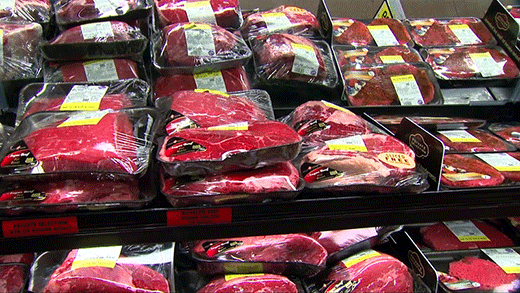
From 2009 through 2015, beef and pork sold in grocery stores was required to indicate on the label where it had originated.
Study: Mandatory labeling had minimal effect on meat demand
K-State economist has released publication taking a look at impact of MCOOL
October 3, 2019
MANHATTAN, Kan. – A Kansas State University agricultural economist says a law that once required mandatory reporting of the origin of meat sold in grocery stores likely did not have an impact on consumers’ demand for those products.
Glynn Tonsor has completed an analysis of meat demand before, during and after the U.S. Department of Agriculture had implemented mandatory country of origin labeling for meat products.
Known as MCOOL, the law was in place in the United States from 2009 through 2015, and required food labels in grocery stores to include a statement indicating where the animal was raised before it was harvested for a meat product.
Essentially, said Tonsor, “if beef and pork products went through the grocery store, then they had to be labeled. With that (labeling) comes the cost of compliance, which goes into a benefit-cost assessment, and an attempt to quantify the benefit. So what we tried to determine is the impact on the demand for meat of that law, and ultimately whether there was a positive benefit-cost ratio.
“There’s no evidence of a positive demand development following implementation of the law,” Tonsor said. “So if you don’t have evidence of a benefit, and you do have evidence of a cost, that’s not a desirable benefit-cost ratio,” which led to the law being repealed in late 2015.
Four years later, Tonsor said there is “no reason to think” that repeal of MCOOL would provide a measurable boost to the demand for meat products. “One of the estimates we have reported looks that way, but there are a lot of things that change. Beef demand or pork demand could be better after MCOOL, and have nothing to do with MCOOL being repealed.”
Recent drivers in meat demand are more likely due to consumers’ higher preference for protein diets, and the population mix from 10 years ago has changed, Tonsor said.
He and his colleagues have published a paper outlining many factors that have affected meat demand before, during and after MCOOL was in place. The fact sheet is available online at www.agmanager.info, and titled, “Overview of MCOOL Impact on KSU Domestic Beef and Pork Demand Indices.”
“I would encourage those who read this to read the other publications we have on beef demand and pork demand,” Tonsor said. “There are a lot of resources that say the last two or three years have been very good on domestic meat demand, and I am not going to attribute that to the absence of MCOOL. There are other factors that are in play, such as consumer incomes rising, favorability of protein in the diet, and more.”
The fact sheet may be especially valuable as there is some renewed interest in bringing MCOOL back.
“I hope all policy decisions and industry leaders make their decisions based on information and research-based knowledge, and less on emotion,” Tonsor said. “I hope this and other resources are part of the knowledge set that guides that process.”

